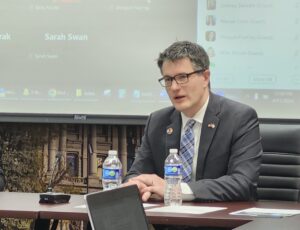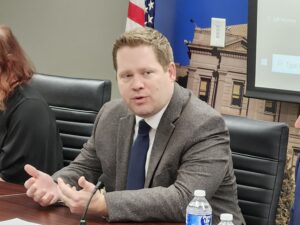An effort to raise fees on nearly every health-insurance policy sold in Colorado is finished even before Thursday’s special legislative session begins, replaced by an alternative that proposes to fund major state insurance-subsidy programs from another source.
Sen. Kyle Mullica, D-Thornton, said in an interview that while it is vital to find ways to help Coloradans afford individual-market health insurance in the wake of federal funding changes, there isn’t a path forward for a bill that would raise fees to do that. Mullica, now a primary cosponsor of the bill, instead is turning to the same source he used to fund safety-net clinics during the 2025 regular legislative session — a loan from the state’s Unclaimed Property Trust Fund.
Congress passed a law in July that reduces subsidies for people buying individual-market insurance on state health exchanges, and it also failed to extend enhanced premium tax credits that limit individuals from paying more than 8.5% of their income for insurance. Colorado Insurance Commissioner Michael Conway estimated 110,000 privately insured residents will drop coverage in 2026 rather than face costs that double, and Democrats have scrambled to find ways keep as many of them covered as possible.
Rep. Kyle Brown, D-Louisville, and others last week submitted a draft bill to raise fees on all healthcare policies by 0.75% to fund the Health Insurance Affordability Enterprise, which oversees exchange subsidies and the reinsurance and OmniSalud programs. The bill also sought to impose a $36 annual fee on stop-loss policies that are purchased by self-insured companies, unions and governments to guard against potentially catastrophic claims.
Pushback leads to major changes

Colorado state Rep. Kyle Brown speaks to the Colorado Chamber of Commerce Health Care Council in April 2024.
While some business leaders questioned how raising fees would help individuals who already face average 28% increases in premiums next year, Brown said the $100 million the bill would raise could take a little from everyone to help those who need it the most. By boosting funding for exchange subsidies and reinsurance — a system by which fees create a pool of money accessible to insurers facing the most expensive claims, thus minimizing individual premium hikes — he predicted 20,000 fewer people would drop coverage.
But, just as had happened when Brown ran a bill during the 2025 regular session to allow different level of fee hikes to fund the HIAE, a bipartisan cadre of legislators began to warn that Coloradans do not want to pay more fees on their insurance policies. Rather than have the bill die again, though, Mullica offered an alternative funding idea — just as he had when Brown attempted earlier this year to cap hospital reimbursements and use savings from the state employees’ insurance plan to fund safety-net clinics.
The latest draft of the HIAE funding bill would have the Unclaimed Property Trust Fund in the state Treasurer’s office — a fund where unclaimed inheritances and other high-dollar items are kept, accruing interest — give an interest-free $100 million loan to the enterprise. Roughly half the money would go toward reinsurance, which would allow the fund to continue enabling roughly 20% discounts on individual policies in the highest-cost counties, and the other half would boost exchange subsidies for lower-income earners.
How the new bill could impact insurance market

Colorado state Sen. Kyle Mullica speaks to the Colorado Chamber of Commerce Tax Council in March 2024.
Like with Brown’s earlier version of the bill, the funding could keep about 20,000 more Coloradans insured — an important boost, as uninsured patients seeking hospital care are unlikely to pay bills and thus force facilities to raise prices for those who remain insured. But at a time when people already struggle to afford healthcare coverage, this won’t ask everyone to pay more and instead will use existing state resources in lieu of federal funding, Mullica told The Sum & Substance.
“Probably the number one thing that a lot of us hear when we’re talking to constituents is the issue of affordability. And I think the goal is to not start off by increasing fees,” Mullica said. “Everything’s going to have to be on the table … But a fee should be the last thing we look at, not the first.”
In exchange for the interest-free loan, which is repayable no later than 2045, the HIAE board would have to boost transparency around the funds that it receives and how it spends them. The bill would require the board to deliver an annual report to the Legislature detailing what existing fees — 2.1% on each insurance policy sold by a for-profit company and 1.15% on policies from nonprofits — bring in and which programs they fund.
But what about OmniSalud?
Republican legislators have expressed particular concern about the HIAE’s OmniSalud program, which offers insurance to about 12,000 undocumented immigrants, though it is set to drop to a maximum 2,700 enrollees next year because of federal funding cuts. While some proposed GOP special-session bills would eliminate the program, the rewritten enterprise funding bill would allow board members to continue paying for it — but only after they prioritize reinsurance and subsidy funding.
Mullica — who is set to co-sponsor the bill now along with Brown, Democratic Rep. Linday Gilchrist and Democratic Sen. Iman Jodeh — acknowledged the measure likely still will face opposition. Some legislators balked last year at taking money from the interest being earned by the Unclaimed Property Trust Fund, while business groups have asked for even more transparency than the bill provides, such as an audit of the enterprise.

U.S. Rep. Jeff Hurd speaks at a Colorado Chamber of Commerce congressional luncheon in August 2025.
The bill, if passed during the special session that is scheduled to begin Thursday, would only go into effect if Congress does nothing this year to extend the enhanced premium tax credits. Democratic legislators continue to lobby the state’s congressional delegation to give those credits more time, and GOP Congressman Jeff Hurd of Grand Junction said during a Colorado Chamber of Commerce event last week that he may be willing to back a limited extension in which the credits are pared down and phased out gradually.
Insurance fees could come back in 2026
Mullica acknowledged that his effort to block fee increases during the special session doesn’t mean advocates of that funding strategy won’t come back in 2026 with another bill to allow the HIAE board to raise fees, saying “everything’s going to be on the table.” But he believes it sets a tone that other options must be considered before asking insurance buyers to pay even more into the enterprise, and he hopes that it will bring payers, providers and healthcare advocates to the table to discuss long-term solutions.
“Fees may be part of that conversation … But if they are, there’s going to have to be some gives and takes,” he said. “If fees are going to be a part of it and fees do go up, you’re going to have to show the people that you’ve done everything you can to find another way first.”
The special session is expected to continue through sometime early next week. The HIAE funding bill is likely to get its first hearing before a House committee on Thursday.
